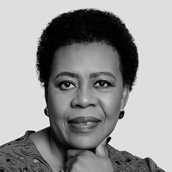
Louisa Mojela is Group Chairman of WIPHOLD.

Nontobeko Ndhlazi is Group CFO of WIPHOLD.
Known as the continent with both the youngest and fastest growing population means that Africa naturally holds the greatest potential for investment prospects. Additionally, having the dubious honor of also being the poorest continent, it provides the broadest and most fulfilling opportunities for impact investing and investment growth potential. This dynamic places women as crucial drivers in the generation of wealth on the continent, since sub-Saharan Africa already boasts the highest proportion of women entrepreneurs globally.
When one looks at the fact that billionaires are generally entrepreneurs and company founders, one wonders then why the women in Africa, who tend to be more entrepreneurial than men, are therefore not represented more meaningfully in the ranks of the wealthy – be it high-net-worth (HNW) individuals, centi-millionaires, or billionaires.

According to Asoko Insight, women founders receive less than 7% of all venture capital funding on the continent. So if one can generalize and extrapolate this across other sources of funding, it is evident that a key missing element to gearing the businesses of women entrepreneurs for growth and success is funding, or rather the lack thereof. Conscious and unconscious biases against women entrepreneurs totally discount the results of several studies that have shown that women are more dependable and thus more likely to repay loans than their male counterparts, especially in the microfinance space.
A fundamental approach to bridge the funding gap lies in three facets of intentionality. Firstly, being intentional about achieving effective gender diversity for teams and decision-making leaders in funding institutions. Secondly, being intentional about acknowledging and tackling biases held about investing in women-led business. And thirdly, being intentional about providing the type of business networking forums that are inclusive of women in a meaningful way.
However, to close the gender gap in business and entrepreneurship, African women do not only need to be recipients of funding and support for their own businesses, but they can also help to close the gap by investing in other women-led businesses. By providing capital and assistance to women entrepreneurs, wealthy women can help to foster economic growth and create more job opportunities. These women can also serve as mentors and role models to young women and girls, providing guidance and support to help them achieve their goals. They can also use their influence to promote women's empowerment and create opportunities for other women to succeed.
African women contribute significantly in general wealth creation for their communities and their countries through consumer spending, participation in the workforce, and business ownership. Yet, despite being such vital players to the continent’s economies, women tend to be disproportionally underrepresented among HNW individuals, centi-millionaires, and even less so among billionaires.
Notwithstanding this, women in general (both wealthy and not so wealthy) still manage to have a considerable social impact on their communities — far greater than what men have. Through philanthropy, women use their financial resources to support charitable causes and organizations to uplift their communities. Their contributions have a transformative impact on their communities in a way that may not necessarily align with their own personal income and wealth. Therefore, growth in the ranks of HNW women would see a substantial and far-reaching expansion in social development initiatives and the related impact on our society.
Affluent African women can use their platforms to advocate for issues that matter to them, such as gender equality, education, social justice, and environmental sustainability. They can use their influence and resources to raise awareness and drive change on a local, national, continental, and indeed global level. As an example, the current year sees 20 African countries (37% of the continent) scheduled to have national elections. Of these, six feature in the Top 10 Wealthiest Countries in the Africa Wealth Report 2024. This year thus represents a unique opportunity for HNW women to use their position in society and their financial resources to influence and support political candidates and campaigns that resonate with their values. By endorsing policies that promote gender equality and social justice, wealthy African women can have a significant impact on the political landscape and promote positive change and stability for their countries and the continent.
Over the next decade, one hopes to see women’s position as key contributors in wealth generation and as altruists align with their capacity to accumulate personal wealth at a more rapid pace. Nevertheless, there are many women-led businesses in Africa that are creating wealth and driving economic growth on the continent. These businesses are diverse and operate in a range of sectors, from agriculture to technology to finance. By supporting women's entrepreneurship and providing access to resources and support, we can help to establish more opportunities for women-led businesses to thrive and propel economic growth in Africa. Overall, women of wealth can have a significant social impact on their local communities as well as nationally and across the continent. By using their resources and influence to support charitable causes, invest in women-led businesses, advocate for issues they care about, mentor and empower the next generation of women leaders, and engage in political activism, affluent African women can make an exponentially positive difference in the world.